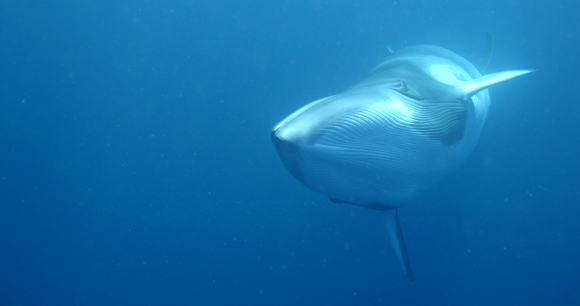
London—After spending more than three decades slaughtering whales in defiance of an international moratorium on commercial whaling, Japan is proposing a package of measures at an International Whaling Commission (IWC) meeting next month that would effectively lift the global ban on for-profit whaling.
Japan’s so-called “IWC Reform Proposal” calls for the formation of a “Sustainable Whaling Committee” to set catch quotas, as well as the convening of a diplomatic conference to amend the International Convention for the Regulation of Whaling. The change would lower the proportion of votes required to set catch quotas from three-quarters of the IWC membership to a simple majority.
Ahead of the Sept. 4 meeting in Florianópolis, Brazil, the Environmental Investigation Agency (EIA) and the Animal Welfare Institute (AWI) have released a new report, Commercial Whaling: Unsustainable, Inhumane, Unnecessary, which exposes continued commercial whaling by Iceland, Japan and Norway and makes the case against any weakening of the moratorium.
“If Japan gets its way, it would be a massive victory for those rogue whalers who have time and again defied the international ban on commercial whaling and an absolute disaster for the world’s whales,” said Clare Perry, EIA’s Ocean Campaigns leader.
Perry added: “According to our research, Japan and fellow commercial whaling countries Iceland, and Norway have collectively killed at least 38,539 great whales since the 1986 ban was put in place. Many whale species have not yet recovered from massive overhunting in the past, and they are also facing a wide array of mounting existential threats ranging from climate change to marine pollution by chemicals, plastics and noise.”
Japan has killed more than 22,000 whales in the Antarctic and North Pacific as part of its sham “scientific” whaling program, selling the whale meat purportedly taken for “research.” In March 2014, the International Court of Justice ruled that Japan’s Antarctic hunt had no scientific basis. Japan, however, has continued to kill whales under the guise of scientific research, and faced intense public backlash in May after reporting that its whaling fleet had killed 122 pregnant whales during its annual “research” hunt in the Southern Ocean last winter.
Norway continues commercial whaling under an objection lodged to the 1986 IWC moratorium, while Iceland has a disputed reservation to the moratorium, which it has used to justify commercial catch quotas since 2006.
“We’re only just beginning to grasp the vital role whales play in maintaining the health of the world’s oceans,” said Kate O’Connell, marine wildlife consultant for the Animal Welfare Institute. “Weakening the ban now would be a fatal mistake, and would open the doors to increased commercial whaling around the world. This cruel and unnecessary industry is a relic of the past that has no place in modern society.”
“All other contracting governments to the IWC must step up to vigorously defend the moratorium from this new assault by Japan and its allies,” O’Connell added.
Margie Fishman, (202) 446-2128, [email protected]
About the Animal Welfare Institute
The Animal Welfare Institute is a nonprofit charitable organization founded in 1951 and dedicated to reducing animal suffering caused by people. AWI engages policymakers, scientists, industry, and the public to achieve better treatment of animals everywhere—in the laboratory, on the farm, in commerce, at home, and in the wild. For more information, visit www.awionline.org. Follow us on Facebook, Twitter, and Instagram for updates and other important animal protection news.
About the Environmental Investigation
The Environmental Investigation Agency (EIA) investigates and campaigns against environmental crime and abuses. Our undercover investigations expose transnational wildlife crime, with a focus on elephants and tigers, and forest crimes such as illegal logging and deforestation for cash crops such as palm oil; we work to safeguard global marine ecosystems by tackling plastic pollution, exposing illegal fishing and seeking an end to all whaling; and we address the threat of global warming by campaigning to curtail powerful refrigerant greenhouse gases and exposing related criminal trade.